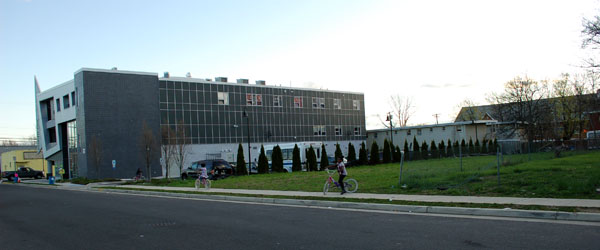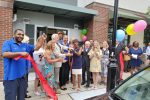Kula Café owners planning urban farm project
Portion of the farm would be used as a community entrepreneurial garden
Interfaith Neighbors is in the planning stages of an urban farm, their newest social enterprise on the city’s West Side following the success of the Kula Café.
The concept is to erect the Kula Urban Farm Project, comprised of a year-round greenhouse and a few outdoor raised beds where individuals can work, learn, and have access to healthy food choices, according to Paul McEvily, associate executive director of Interfaith Neighbors.
Interfaith Neighbors owns and operates the Kula Café, a restaurant and a job training program located in the Springwood Center at 1201 Springwood Ave. The cafe provides a sixteen week hospitality-focused training program to students who wish to work in front-of-house positions as servers, bussers, runners, and hosts, within area restaurants.
The urban farm will extend that spirit of the café by serving as a commercial business selling plants, vegetables and leafy greens for profit with a portion of the farm to be used as a community entrepreneurial garden.
A community engagement element would allow residents and community members to volunteer at the farm in exchange for produce or revenue generated by that portion of the farm, but will not operate as a full fledged co-op, he said.
Workshops on healthy eating and living healthier lifestyles through farm-to-table ventures will also be an element of the Kula Urban Farm enterprise, he said.
The proposed farm lot is located adjacent to the parking lot used for the Springwood Center on the north side of the building [shown at top, between the shrubbery and fence], and measures 50 feet wide by 150 feet deep, McEvily said.
The lot is currently zoned for residential use. Representatives from Interfaith Neighbors are scheduled to appear in front of the city’s zoning board May 13 to seek a variance. If the variance is granted, McEvily is hopeful construction at the site will start some time later this year on a year-round greenhouse built as a non-permanant structures so if there is higher, better use for the property, the site can be moved to accommodate development, he said.
A 1960s style hotel that was boarded up for well over 15 years previously exited on the lot prior to Interfaith’s purchase of the property. Once the property was acquired, the building was demolished to eliminate the eyesore, he said.
Interfaith has been working with staff of Rutgers University and established urban farmers to help with the planning process. Ultimately, the nonprofit would look to hire someone that has the right set of credentials, who is not only knowledgeable about urban agriculture, but who is also interested in social enterprise and the Kula concept itself.
“What we would expect to produce are premium leafy greens, fresh fruits and vegetables,” said McEvily.
Both soil-bedded crops and hydroponic crops would be grown at the farm, which requires knowledge of engineering and mathematics, providing a well-rounded way to engage local youth and teach at the same time, McEvily said.
Local restaurant owners have already expressed interest in purchasing the farm’s yield, he said.
“We’re really excited about it,” said McEvily. “It will create jobs and we’ll be able to supply a local market need.”
The Mary Borden Foundation gave a $150,000 multi-year grant to fund the project, McEcily said.
The foundation, based in Rumson, is a longtime supporter of Interfaith’s work, and previously gave a $150,000 grant for the Business Development Center which also operates out of the Springwood Center.
“We are ever so grateful for this multi-year grant from the Mary Owen Borden Foundation,” said McEvily, who also is a board member of the Borden Foundation.
————————————————————
Follow the Asbury Park Sun on Facebook and Twitter.















